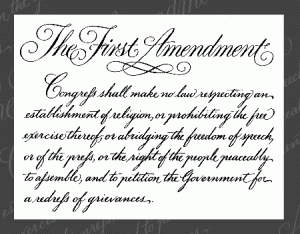James Taranto in his “Best of the Web Today” column in The Wall Street Journal:
Shirley Sherrod says she plans to sue conservative blogger Andrew Breitbart, the Associated Press reports from San Diego: “Speaking Thursday at the National Association of Black Journalists convention, Sherrod said she would definitely sue over the video that took her remarks out of context”:
Sherrod said she had not received an apology from Breitbart and no longer wanted one. “He had to know that he was targeting me,” she said.
Does she have a winning case? Probably not.

For one thing, the alleged defamation (or, to be precise, the defamation that she would allege if she filed suit) took place while she was a public official and involved claims about the performance of her public duties. Thus she would have to meet the rigorous standard, set forth by the Supreme Court in New York Times v. Sullivan (1964), of proving not only that Breitbart published a damaging falsehood about her but that he did so “with ‘actual malice’–that is, with knowledge that it was false or with reckless disregard of whether it was false or not.” Even if she proves that Breitbart published false and defamatory statements about her, he wins the case if he did so only negligently.
To put it in layman’s terms, she would have to demonstrate that the falsehood Breitbart published about her–the claim that the video showed “her federal duties are managed through the prism of race and class distinctions”–was a lie, not just an error. But Breitbart issued a timely correction of this statement, creating a strong presumption against such an allegation. (As to video itself, Breitbart could almost certainly defend it as truthful.)
Blogger William Jacobson notes some other pitfalls for Sherrod of suing Breitbart–the most notable is that if the case went ahead, he would be able to use the discovery process to uncover new information about her and about his other adversaries whose conduct is relevant to the case, namely the NAACP and the Obama administration.
Of course, she hasn’t actually filed a lawsuit, and our guess is that a smart lawyer will advise her against it–and that if she does sue, she will end up settling in exchange for an apology or a more emphatic correction. Her threat to sue, in short, is largely an empty one, even if one can empathize with her feeling of having been wronged by Breitbart.
But one aspect of this story strikes us as passing strange: The venue in which she issued this threat was a convention of journalists. What’s more, someone who was there tells us that when she said she planned to sue, the audience applauded. Our source was careful to note that there were nonjournalists in the audience too (PR men and corporate sponsors). Still, we have to ask: What kind of journalist would applaud the threat of a defamation lawsuit?
Journalists have an institutional interest in maximizing the scope of First Amendment protections, and that means keeping it as hard as possible for plaintiffs to sue for defamation. Even meritless defamation suits against journalists and news organizations are a nuisance. Thus one would expect journalists to have a general antipathy to the idea of defamation lawsuits, even when sympathetic to a particular prospective plaintiff.
We have noted that Breitbart is not a traditional journalist, and it follows from this that he has no special claim on the sympathy of those who are. Our point, however, is that the interests of defamation plaintiffs run counter to those of journalists, regardless of whether the defendants are journalists or are doing journalism.
New York Times v. Sullivan is itself a case in point. Although the defendant was a newspaper, the published material at issue was not news but a political ad–an open letter from the Committee to Defend Martin Luther King and the Struggle for Freedom in the South, which criticized officials in Jim Crow-era Alabama for their treatment of civil rights demonstrators.
Journalists depend more on the First Amendment than just about anyone else, but we more than anyone should be cognizant that the protections we enjoy as we do our work apply to everyone, including civil rights advocates–and Andrew Breitbart.
COMMENTS
Please let us know if you're having issues with commenting.